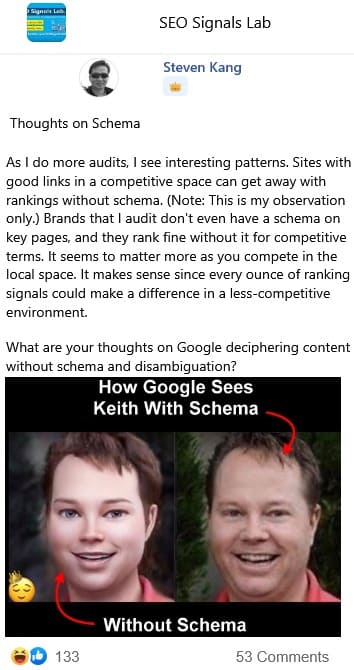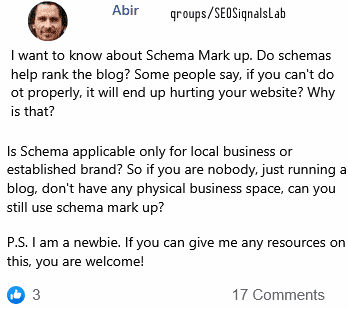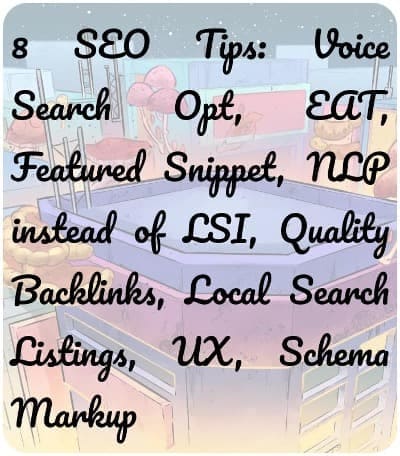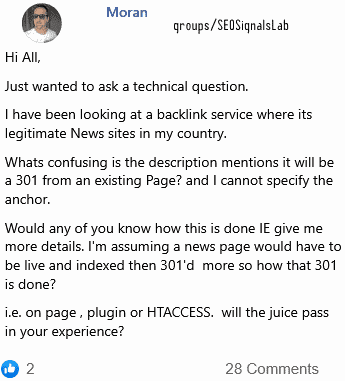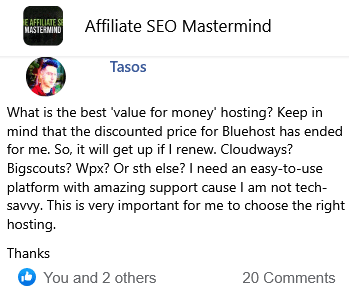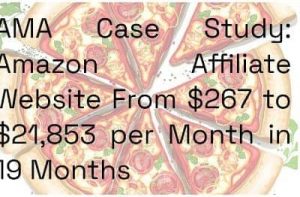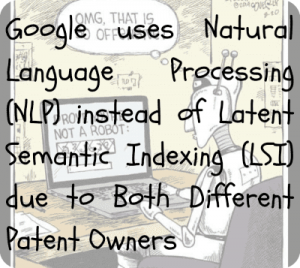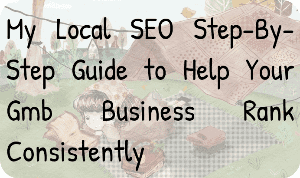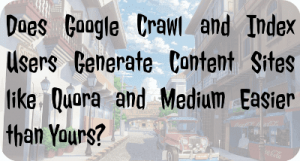Thoughts on Schema
As I do more audits, I see interesting patterns. Sites with good links in a competitive space can get away with rankings without schema. (Note: This is my observation only.) Brands that I audit don't even have a schema on key pages, and they rank fine without it for competitive terms. It seems to matter more as you compete in the local space. It makes sense since every ounce of ranking signals could make a difference in a less-competitive environment.
What are your thoughts on Google deciphering content without schema and disambiguation?
70 🤭61 👍🏽13353 💬🗨
📰👈
I work in the blogger world – and oh dear god what they put Google through to figure out anything going on with their sites with regard to schema!!
The ones I help square out their Search Engine Optimization (SEO) foundation, including schema, shoot to the top in their super crowded niches. They don't overtake ranking of sites that had SEO right for years already and are seen as more authoritative, but they are at least on the same page with them.
This is my view as well. Schema gives clarity, not a ranking boost. Internal links may give some boost to a page in context though, so used together, they should focus where you rank.
MaAnna
Exactly Dixon. A good example is having microdata schema from the theme plus JSON-LD from their SEO plugin that doesn't have global settings configured, so the top down schema is missing. Plus a recipe card with schema. Plus a YouTube embed with schema. All on one post. Google has no idea what they are trying to rank for
Marty Marion 🎓
I don't know nuthin"bout no discombobulation nonsense (jk, I absolutely do but for some reason I'm in a silly mood today)…
BUT on a serious, you said "It makes sense since every ounce of ranking signals could make a difference in a less-competitive environment.". I would propose exactly the opposite.
All else being equal between competitors, an ounce of incremental ranking mojo could make the tie-breaker. So the impact of the extra ounce should be MORE pronounced and important in a MORE competitive race not a less competitive environment.
In a non competitive niche – it actually might be more of a ranking signal than a competitive one where it's more of a classification and qualification signal.
BERT kicks in on the search term regardless. There's no real knowledge graph here, so we're playing the old school "Match the Keywords" game to rank things.
Now… some sites are JUST playing that game, but a couple sites also have schema that not only has the words, but attempts to classify and qualify them. So Google may very well say, "Well, the words match here, but these pages are sending things and the BERT side likes those better because it's looking for products and I see product schema – let's favor these." Something like that could very well be in play.
💟3
Marty Marion 🎓 » Truslow
I get your deconstruction completely and agree. My point was a little differently slanted (or at least that was my intention)… I focus primarily on competitive advantage, not on ranking for the sake of ranking.
In the realm of competitive advantage as it applies to Search Engine Optimization (SEO), I see three aspects:
1. Convincing (or making the motions to convince) Google that your pages are more worthy of being ranked higher than your competitors' pages for the same or closely related search queries. This is the primal level, since if you aren't ranking it's not likely you'll be found; so you have to get the visibility, but this by itself is not nearly enough.
2. Assuming one can get G's attention and get G to award your page(s) top organic position, you need to get the click. With G re-writing titles and descriptions, which are the ONLY things searchers see for the most part when they have to decide which of those Search Engine Result Page (SERP) listings to click on, informing G on a higher plane, as one can do with proper schema, for example, gives you a higher likelihood that G won't make a complete hash out of your intended titles and descriptions, and that can increase the potential for getting the click, which is exactly what SEO is (or should be) all about (brand awareness and ego excluded).
3. "Educating" Google to a finer degree of precision about relationships with and to entities, and becoming "prettier" in G's eyes to show you off for specific search queries.
So, back to Steven Kang's post and point, little incremental signals can (and actually DO) make a difference, and in the aggregate (over a larger number of pages) it can be even a much more pronounced difference in competitive advantage.
I still stand by my assertion that the MORE competitive the search query / topic is, the MORE important these little increments can be, whereas if the playing field is truly wide open, you're likely to rank in the face of a less directly competitive landscape.
Truslow 🎓
Agreed – it's the "type" of importance and value that differs – and the value (or need, maybe) is greater on a more competitive niche.
Josh » Truslow
So in the end, the answer is "it depends"
Truslow 🎓
Those are the first two words of the answer to EVERY SEO question. I know people think of that as a joke, but it really is true.
📰👈
Truslow 🎓
Okay… one by one…
First, schema's job is really only to explain the purpose and function of the things found on the page. It classifies, disambiguates, and validates things. Google has stuff in its algo that can accomplish the same thing, though. What schema's main benefit is that it does all those things clearly so that Google can compare what it "thinks" the page is saying and doing to what the schema can "confirm" right away. Without the schema, Google will probably eventually figure it out on its own – so long as the page really DOES say something and have an identifiable purpose. (And if it doesn't the schema and the page's stuff won't match up so the schema won't help much there either.)
Basically – at the end of the day… it helps Google understand more quickly and with more confidence.
Now… Links. Aside from Press Release (PR) and all the link juicy stuff – they help Google understand context. It knows certain things about the pages that link to you and also about the pages that you are linking to. So those signals can – eventually, after a lot of math is run – help a lot with classification and disambiguation issues.
It helps in Local pretty much across the board because in order to rank locally, Google MUST absolutely have some information in the knowledge graph in order to do so. Most importantly are your Name and Location. And of course it needs to understand the type of business you are in order to rank for that. And it needs to know the products or services you offer in order to rank for that. Location and brand are ABSOLUTELY knowledge graph driven. The other things are too – but other things can come into play, too. Someone might mention how great your restaurant's peanut butter and jelly (PBJ) sandwiches are – and therefore decide that it can rank you for someone looking to buy a PBJ.
For other things – it really depends upon the niche and how well built out the knowledge graph is within that niche. If Google didn't already understand that hero, hoagie, grinder and sub were regional versions of the same thing – you'd have to optimize for all four (if you wanted to rank for all four). Since it knows, though… you only need to use one. Say "Hero Sandwich" and Google will be able to rank you for any of the other three (or more) variations on the same thing.
Adding structured data to disambiguate "hero" helps, too. Structured data says clearly that you actually mean "Submarine Sandwich" when you say "hero". Without that, you have to wait for the algorithm to realize that you're combining the word "Hero" with "Sandwich" before it can be sure you're talking about a Sandwich and not Superman.
The most fun (and powerful) thing with Structured Data, though – is actually using it to create, influence, and/or attach ourselves to the knowledge graph. We do that with our client's brand all the time… Create the brand entity (if it doesn't exist), influence the attributes that define what it means, and make the connections to the product, services, and other entities that relate to what the business does. If Google knows nothing about the brand yet – structured data lets you shape and mold the whole thing quickly. If someone has done a crappy job before you and positioned the brand improperly – structured data means you can clean that up more quickly than without. (I have a client who makes chemical coatings but Google had them classified as a Paint Store. Without structured data of some sort, it may have taken a year to sort that out. With it – we got it sorted in about three months).
Sometimes you get a client whose whole industry Google knows nothing about or that is so confused about that it won't even show any cards. I love these – because I not only get to define my client's brand, but I get to define and shape the entire industry (within the limits of reality, since there ARE other signals out there) and how my client fits into it. I have a client with a specialized industry within equipment parts. Google knew nothing substantial about the industry. It now not only understand the industry fairly well, but has our client positioned as the leading expert and site on the topic, in spite of the fact that there are least 4 other companies with much larger market shares of the industry. (Though that gap is closing due to the Web thinking they're tops).
At the end of the day – Schema helps with things in a completely different way than many people think. It's not a ranking factor in that it will make you rank above someone else – it's a signal that gets you considered in a list of results in the first place – and helps determine just how closely what you have matches up with what BERT thinks the person is asking for.
💟17
Agree 100%
Phil » Truslow
Totally how I see it. It's about being in the "right pile" when you're being ranked.
If you're in the wrong pile, or no pile, you'll necessarily rank poorly.
If you're already in the right pile, it may not make any difference.
Truslow 🎓
I still have the most fun when I get to be the one to shape the piles I'm in.
Nagar » Keith L Evans
I don't think it's tech niche🤔
📰👈
Pavel
So, without giving too many details I spoke with a software engineer who works at Google.
This software engineer's current role is working on moving legacy local search queries from the old legacy ranking engine to a newer machine learning engine.
This fascinated me. Which means different local search queries will most definitely be using different ranking factors depending on the location and the query.
Micha
I used the Data Highlighter tool for years to avoid getting into Schema. I'm sure others have used it, too. That might make a difference for some sites with a lot of content that uses custom/bespoke layouts.
I used to use that tool a lot, also. Before HTML5, it was an easy way to designate the templated areas of the site – header, footer, sidebars, content areas, etc. Once HTML5 came into play though… enough with that nonsense. <nav> and <header> and tags like that in the template/theme were a lot easier.
I can definitely say – semantic markup (or using the highlighter tool to tell Google the sections of the pages) absolutely helps Google score and rank a page.
Keith
Sure…schema it up! But it isn't as powerful as a strong external backlink and never will be. With schema, you are looking to "guide" Google to your entities. If you have the entity clearly defined in your text, schema might be superfluous. But Clint is the master here so I will defer to his wisdom in these matters.
Nope, schema won't be as strong alone as backlinks are as strong alone. But putting both together is a great way to rank pages.
Dixson
Can you rank without Schema? Yes.
However, Daryl Osborne and I have found Schema creates clarity around an entity and improves SEO while rarely penalizing. (it is still possible to create entity pollution).
And, rich snippets are significantly more likely to happen with schema, particular for schemas like recipes and video key moments.
InLinks Number 1
Adria
We've found that sites that have less authority but more refined schema over our site actually rank HIGHER for some of the most competitive terms. For instance they break down the higher level pages within the schema because they appear in the menu – they don't have more back links and they don't have more traffic. Their content is also minimal. So the only defining factor …. Schema.
I'm sure that many will have a lot to say about this but I've been isolating it for a while now. I will be testing this theory in Q1 by changing our schema to include the top level pages. Game on …
Christopher
Aside from the fact that the output of any schema can be beneficial for clarifying underlying information there are a few things to consider. First, not seeing a schema markup, doesn't mean there is none since you can create some sort of internal markup within Google itself with their tools. Second, Google became better in extracting information on a page and attributing it to the according entities and relations. So there is an internal "schema" attribution model anyways. Now, we may be able to contribute or enhance their data set with our markup but we shouldn't think there is none…
This is a really good point. Schema's biggest benefit is in "How Quickly" Google can start to make sense of something (i.e. if it doesn't need to run the extraction routines just to get started) and "How Confident" Google can be that what it thinks it's seeing is what is actually there.
Without any schema – Google will eventually figure it out in time, most likely. And it will eventually start to gain confidence in that it has things figured out properly – or adjust itself and try again.
💟3
Marvin
I find the concept of schema for ranking…counterproductive to what Google wants. Not to say it doesn't work, as building links manually is also actually counterproductive to what Google want.
Google doesn't want you to manipulate their algorithm into ranking your pages, they want you to write for Users, not a Bot and they'll take care of the rest. Schema is precisely writing for a Bot rather than a User, and if it can influence rankings, precisely manipulating their algorithm into ranking your pages.
I think it's obvious what Schema does. It states clearly to Google what your page is about, but they will probably cross-reference that with their own interpretation of what your page is about based on what content you are actually serving to the users.
Therefore, if you have optimized your page properly, send the right User Signals that match the search intent of the Users, have the right signals from the backlinks and internal links, you shouldn't need schema.
I don't think Schema helps with rankings, specially with competitive queries, I don't think it's an "added" ranking bonus. I think what Schema does is to help Google identify what your page is about quicker, and therefore process your classification into their rankings algorithm sooner, and this would mostly only apply to very low-competition keywords. There are also the rich snippet results it can generate which could lead to indirect ranking factors.
An analogy might be something like:
– Person applies to join the football team.
– Application is delayed because this person didn't specify on the form whether they're male or female and therefore the organisers do not know which team to put them on.
– Organisers will have to take more time to ascertain the sex of the person (call them, email, look at the name…)
Specifying your sex on the form would help to speed up that process, but it wouldn't help you get picked for the football team. There are only 11 spots, that would come down to who is the most qualified, most skilled, or in Search Engine Optimization (SEO), most authority, most relevant, closest etc.
That's pretty much spot on. Schema describes, classifies, and helps verify that what Google thinks the content represents is what it actually represents.
In some cases, though – such as recipe blocks and other featured snippets on Google – schema is required.
Interestingly enough, one of the ones people tend to use the most is FAQPage schema to get into People Also Ask lists – but you can definitely get in there without it – pretty easily, really.
Schema helps Google get there faster and also helps match the entities identified in the search term with the entities on your page. That's about it.
📰👈
